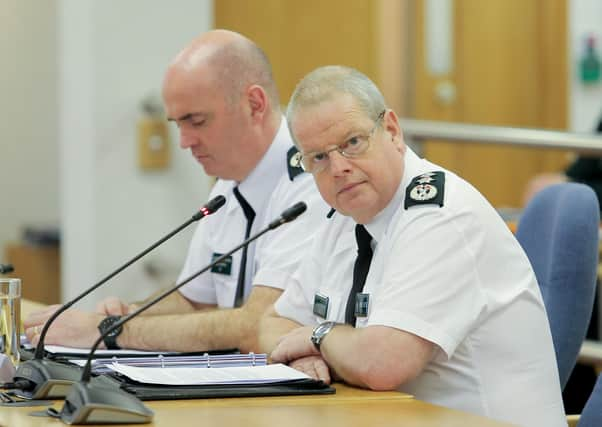Auditors say PSNI is ‘storing up problems’ as staff absence levels hit all-time high


The latest NI Audit Office (NIAO) report on the police service is critical of how a long-term strategy to manage the organisation’s budget “turned very quickly to reducing headcount”.
As the PSNI implemented a methodology known as Priority Based Resourcing (PBR) in an effort to reduce financial pressures, the number of police officers fell by 7% and civilian staff by 5%.
Advertisement
Hide AdAdvertisement
Hide AdDuring the same period, overall staff absence increased from an average of eight days in 2010-2011 to 14 days in 2018-2019.
At the same time, the number of PSNI officers on restricted duties has doubled, the ‘Reducing Costs in the PSNI’ report also reveals.
Comptroller and Auditor General, Kieran Donnelly, said: “Despite significant cuts; a reducing headcount; and increasing demands crime outcome rates and confidence in the PSNI have remained stable. However, the focus on short term cost reductions means that it has been storing up problems for the future.
“Staff absence is at an all-time high and there is a backlog of building maintenance which will need £27 million to deal with.”
Advertisement
Hide AdAdvertisement
Hide AdMr Donnelly added: “It is essential that PSNI manages its budget in a long term strategic way to address the issues that have been created as a result of top-slicing budgets over the last nine years’.
Welcoming the report, deputy chief constable Mark Hamilton said the PSNI accepted its findings and recommendations.
“We will take the learning and apply it to our future efficiency programmes,” he said.
“Over a ten year period, PSNI experienced budget cuts that the NIAO has recognised were more severe than those inflicted on most other police services in the United Kingdom. There is no doubt that delivering such significant cuts in funding represented an unprecedented challenge for PSNI. To provide some perspective, the real terms cut of £200m equated to an officer headcount of 4,000 constables.”
Advertisement
Hide AdAdvertisement
Hide AdDCC Hamilton said the chief constable, Simon Byrne, “has recognised the impact of sustained cuts and under investment in the service,” and added: “As a result, a series of strategic business cases have been prepared to increase headcount, improve the built estate and better harness new digital capability.
“In the interim, the chief constable has radically increased the number of neighbourhood officers. Our new standstill budget settlement will be a test of lessons learned as we wrestle with the competing demands of a severe terrorist threat, recovery post Covid-19 and an insatiable desire for more neighbourhood policing.”
Northern Ireland Policing Board Chair Doug Garrett has also welcomed the NIAO report.
Mr Garratt said: “The report recognises the range of challenges faced by the PSNI in making substantial reductions over the last number of years and some of the unique issues faced by policing in managing budgets including the ability to carry forward financial reserves.
Advertisement
Hide AdAdvertisement
Hide Ad“In supporting future transformation of the service, the Board has agreed a new Chief Operating Officer position for the PSNI to drive forward strategic change, business modernisation and bring focus to achieving value for money in resource utilisation.”